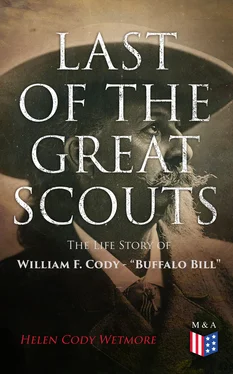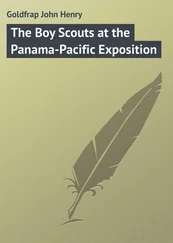Nature seemed to join her protest to Will's silent antagonism. A terrific thunder-storm came up with the noon hour of the wedding. So deep and sullen were the clouds that we were obliged to light the candles. When the wedding pair took their places before Hymen's altar, a crash of thunder rocked the house and set the casements rattling.
The couple had their home awaiting them in Leavenworth, and departed almost immediately after the ceremony.
The cares and responsibilities laid upon our brother's shoulders did not quench his boyish spirits and love of fun. Not Buffalo Bill's! He gave us a jack-o'-lantern scare once upon a time, which I don't believe any of us will ever forget. We had never seen that weird species of pumpkin, and Will embroidered a blood-and-thunder narrative.
"The pumpkins all rise up out of the ground," said he, "on fire, with the devil's eyes, and their mouths open, like blood-red lions, and grab you, and go under the earth. You better look out!"
"That ain't so!" all of us little girls cried; "you know it's a fib. Ain't it, mother?" and we ran as usual to mother.
"Will, you mustn't tell the children such tales. Of course they're just fibs," said mother.
"So there!" we cried, in triumph. But Will had a "so there" answer for us a few nights later. We were coming home late one evening, and found the gate guarded by mad-looking yellow things, all afire, and grinning hideously like real live men in the moon dropped down from the sky.
"Jack-o'-lanterns!" screamed Eliza, grabbing May by the hand, and starting to run. I began to say my prayers, of course, and cry for mother. All at once the heads moved! Even Turk's tail shot between his legs, and he howled in fright. We saw the devil's eyes, the blood-red lion's mouths, and all the rest, and set up such a chorus of wild yells that the whole household rushed to our rescue. While we were panting out our story, we heard Will snickering behind the door.
"So there, smarties! You'll believe what I tell you next time. You bet—ter—had!"
But he liked best to invade our play-room and "work magic" on our dolls. Mother had set aside one apartment in our large log house for a play-room, and here each one of our doll families dwelt in peace and harmony, when Will wasn't around. But there was tragedy whenever he came near. He would scalp the mother dolls, and tie their babies to the bedposts, and would storm into their pasteboard-box houses at night, after we had fixed them all in order, and put the families to standing on their heads. He was a dreadful tease. It was in this play-room that the germ of his Wild West took life. He formed us into a regular little company—Turk and the baby, too—and would start us in marching order for the woods. He made us stick horses and wooden tomahawks, spears, and horsehair strings, so that we could be cowboys, Indians, bullwhackers, and cavalrymen. All the scenes of his first freighting trip were acted out in the woods of Salt Creek Valley. We had stages, robbers, "hold-ups," and most ferocious Indian battles.
Will was always the "principal scalper," however, and we had few of our feathers left after he was on the warpath. We were so little we couldn't reach his feathers. He always wore two long shiny ones, which had been the special pride of our black rooster, and when he threw a piece of an old blanket gotten from the Leavenworth barracks around his shoulders, we considered him a very fine general indeed.
All of us were obedient to the letter on "show days," and scarcely ever said "Now, stop," or "I'll tell mother on you!" But during one of these exciting performances Will came to a short stop.
"I believe I'll run a show when I get to be a man," said he.
"That fortune lady said you'd got to be President of the United States," said Eliza.
"How could ze presiman won a show?" asked May.
"How could that old fortune-teller know what I'm going to be?" Will would answer, disdainfully. "I rather guess I can have a show, in spite of all the fortune-tellers in the country. I'll tell you right now, girls, I don't propose to be President, but I do mean to have a show!"
Such temerity in disputing one's destiny was appalling; and though our ideas of destiny were rather vague, we could grasp one dreadful fact: Will had refused to be President of the United States! So we ran crying to mother, and burying our faces in her lap, sobbed out: "Oh, mother! Will says he ain't going to be President. Don't he have to be?"
Still, in spite of Will's fine scorn of fortune-tellers, the prophecy concerning his future must have been sometimes in his mind. This was shown in an episode that the writer is in duty bound, as a veracious chronicler, to set down.
Our neighbor, Mr. Hathaway, had a son, Eugene, of about Will's age, and the two were fast friends. One day, when Will was visiting at Eugene's house, the boys introduced themselves to a barrel of hard cider. Temperance sentiment had not progressed far enough to bring hard cider under the ban, and Mr. Hathaway had lately pressed out a quantity of the old-fashioned beverage. The boys, supposing it a harmless drink, took all they desired—much more than they could carry. They were in a deplorable condition when Mr. Hathaway found them; and much distressed, the good old man put Eugene to bed and brought Will home.
The family hero returned to us with a flourish of trumpets. He stood up in the wagon and sang and shouted; and when Mr. Hathaway reproved him, "Don't talk to me," was his lofty rejoinder. "You forget that I am to be President of the United States."
There is compensation for everything. Will never touched cider again; and never again could he lord it over his still admiring but no longer docile sisters. If he undertook to boss or tease us more than to our fancy, we would subdue him with an imitation of his grandiloquent, "You forget that I am to be President of the United States." Indeed, so severe was this retaliation that we seldom saw him the rest of the day.
But he got even with us when "preacher day" came around.
Like "Little Breeches" father, Will never did go in much on religion, and when the ministers assembled for "quarterly meeting" at our house, we never knew what to expect from him. Mother was a Methodist, and as our log house was larger than the others in the valley, it fell to our lot to entertain the preachers often. We kept our preparations on the quiet when Will was home, but he always managed to find out what was up, and then trouble began. His first move was to "sick" Turk on the yellow-legged chickens. They were our best ones, and the only thing we had for the ministers to eat. Then Will would come stalking in:
"Say, mother, just saw all the yellow-legged chickens a-scooting up the road. Methodist preachers must be in the wind, for the old hens are flying like sixty!"
"Now, Will, you call Turk off, and round up those chickens right away."
"Catch meself!" And Will would dance around and tease so he nearly drove us all distracted. It was with the greatest difficulty that mother could finally prevail upon him to round up the chickens. That done, he would tie up the pump-handle, milk the cows dry, strew the path to the gate with burrs and thistles, and stick up a sign, "Thorney is the path and stickery the way that leedith unto the kingdom of heaven. Amen!"
Then when mother had put a nice clean valance, freshly starched and ruffled, around the big four-poster bed in the sitting-room, Will would daub it up with smearcase, and just before the preachers arrived, sneak in under it, and wait for prayers.
Mother always desired us to file in quietly, but we couldn't pass the bed without our legs being pinched; so we "hollered," but were afraid to tell mother the reason before the ministers. We had to bear it, but we snickered ourselves when the man Will called "Elder Green Persimmon," because when he prayed his mouth went inside out, came mincing into the room, and as he passed the valance and got a pinch, jerked out a sour-grape sneeze:
Читать дальше












